 Il Dolce Far Niente! A favorite slogan of dreamy-eyed foreigners as they contemplate a long, slow vacation—or an expat experience—in that mythical land known as Italia. Yes, for those of us coming from the rat race of the U.S., the frozen tundra of Canada, or the proper stodginess of the U.K., the “sweetness of doing nothing” in sunny Italy certainly has its romantic appeal.
Il Dolce Far Niente! A favorite slogan of dreamy-eyed foreigners as they contemplate a long, slow vacation—or an expat experience—in that mythical land known as Italia. Yes, for those of us coming from the rat race of the U.S., the frozen tundra of Canada, or the proper stodginess of the U.K., the “sweetness of doing nothing” in sunny Italy certainly has its romantic appeal.
Stop right there. Before you give away all your possessions and buy a one-way ticket for a permanent Roman Holiday or a lifetime of Tuscan Sun, let’s examine this “sweetness” a little closer. For now, I’m happy to grant you the “doing nothing” portion of this popular phrase, but as we’ll soon see, there’s another way to read it, which has more basis in reality.
As is often the case, a story will illustrate this point better than a list of facts and information. I submit for your consideration “A Day in the Life in Rome.”
Life in Rome
I leave my apartment at 9:30 a.m. with a modest list of three tasks to accomplish for the morning: I need to mail a few letters to the U.S., buy some baby formula at the supermarket, and pick up a prescription at the pharmacy.
Seems simple, right? In fact, I should be able to easily get it all done by noon, and still have time to stop for a drink on my way home for lunch. But wait…we’re not back in ‘Merica at the moment, so maybe we need to rethink the timetable.
For those readers in the U.S., consider a retail destination like Target, for example. You can purchase nearly anything that your imagination can conjure at a store like Target; from fresh vegetables, to a flat-screen TV, to cigarettes, to baby items. You can buy postage stamps, have your vacation photos printed, pick up your prescription for Lipitor, and grab a copy of your favorite gossip rag at the cash register as you’re checking out.
In sum, one stop for all your consumer needs, accomplished in probably about 40-45 minutes. Efficient, no?
Yes. Now let’s have a look at the antithesis of efficient. How long do imagine that my humble list of three errands will take in Italy?
(Hint: think in terms of days, not in minutes or hours.)
First Stop: Coffee Bar
No matter what my schedule is for the day, my first stop is always the coffee bar just around the corner from my apartment. There’s actually one on the ground floor of my building, but it lacks character. And people. It’s almost always empty, except for the two or three Pakistani guys feeding coins into the slot machines in the back of the bar.
So I go to my usual spot to see who’s there, and to buy my metro pass for the month. Yes, some bars sell transportation tickets, as well as cigarettes, lotto tickets, and other simple purchases.
But first things first: un caffè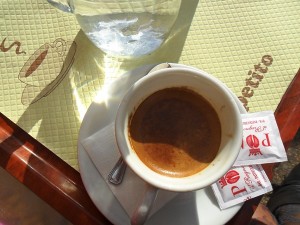
When ordering a coffee, remember that a normal coffee in Italy is an espresso. If you want an American-style coffee, it is (not surprisingly) referred to as caffè americano. Then there are the countless variations: a macchiato is an espresso with just a splash of milk; a cappuccino is a big cup of steamed milk with a shot of espresso and some foam on top; a caffè latte is a tall glass of milk with espresso. Be careful, because if you ask for a “latte,” you’ll just get a plain glass of milk with no coffee in it. You must ask for a caffè latte. Starbucks doesn’t have a clue about real coffee.
The normal procedure is that you first pay for the coffee at the cash register (cassa), and then present the receipt (scontrino) to the barista. However, if you’re a regular at a particular bar, you can usually just pay on your way out.
So on this day, as I’m paying for my coffee on the way out, I ask the owner if I can buy a monthly metro pass (abbonamento mensile). He says that he’s out of them for this month, but I should try the newsstand (edicola) down the street because apparently, and I quote, “he ALWAYS has extra tickets.”
Second Stop: The “Edicola”
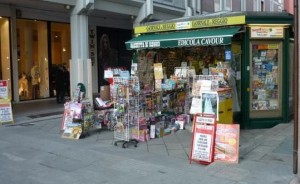 The edicola is technically a newspaper stand, but they also sell other media-related consumables. You can often find English language newspapers and magazines here, as well as comic books, CDs, DVDs, softcore porn, and a variety of other specialty items that can’t easily be found elsewhere.
The edicola is technically a newspaper stand, but they also sell other media-related consumables. You can often find English language newspapers and magazines here, as well as comic books, CDs, DVDs, softcore porn, and a variety of other specialty items that can’t easily be found elsewhere.
And yes, in theory, they also sell public transportation tickets. However, this particular edicola on this particular day was sold out, contrary to my barista’s information. In fact, I’m starting to believe that “Murphy” was actually Italian, because his “Law” applies in Italy more often than anywhere else in the world that I’ve even been, including Ireland.
“Don’t worry,” says the newspaper man, “the tobacco shop three streets over has a few left.”
Third Stop: The Tobacco Shop
After walking three streets in the opposite direction from where I was originally heading, I found the aforementioned tobacco shop to be closed. The sign on the door said that he opens at 9:30, but alas nobody was there when I arrived at 10:05.
I dart into the coffee bar next door for my second espresso of the day.
Fourth Stop: Coffee, this time make it a double
The local bar is the hub of daily life in Italy. Pick a favorite and go back a few times. After your third or fourth visit, you’ll practically be considered a regular. I just love it; it’s one of my favorite things about life in Italy.
Well, I wasn’t known at this particular establishment, so I paid for my coffee at the cash register, and brought the little receipt to the bar. If it’s a crowded place, try to make eye contact with the barista as you place the receipt on the bar with a coin on top of it. 20 cents (centessimi) is enough.
Also, standing at the bar is better than sitting at a table most of the time. It’s cheaper, more social, and if I may say so, more “Italian.”
I asked the barista if he knew the tobacconist next door, or if he knew what time his shop usually opens.
“Normally he opens at 9:30. But Roma won last night against Lazio—the match went late, the celebrations later still. He’ll get here when he… oh, wait…there he is now.”
Fifth Stop: Back to the Tobacco Shop
As I approach the door, I see that the tobacconist has assumed his position at the cash register inside his store.
Tobacco shops can be a great convenience sometimes and you should always be familiar with the ones in your neighborhood.
“But I don’t smoke,” you might say. “Why would I ever need a tobacco shop?” For reasons that I’m not able to explain, a tobacco shop is usually your safest bet for buying transportation tickets. And not only that, surprise-surprise, the tabaccaio (or tabacchi) sells lots of other interesting (read: random) items. Perhaps you’re starting to understand the “scavenger hunt” nature of daily life in Rome alluded to in the title of this article.
Most tabacchi carry phone cards (scheda telefonica), which are generally the cheapest way to phone outside of the country. If you have an Italian cell phone, he can reload (ricarica) your minutes for you via an Internet connection.
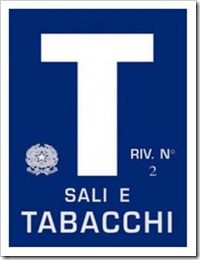 Larger shops often sell stationary, greeting cards, pens, lighters, watches, candy, batteries, and sometimes fine jewelry, as well. They carry an odd array of products, but it’s usually exactly what you’re looking for. And, yes, you can actually purchase cigarettes, cigars, and other tobacco products at a tabacchi, too. (You thought that I was going to fool you with yet another one of those inexplicable “exceptions” that Italians seem to love so much, right?)
Larger shops often sell stationary, greeting cards, pens, lighters, watches, candy, batteries, and sometimes fine jewelry, as well. They carry an odd array of products, but it’s usually exactly what you’re looking for. And, yes, you can actually purchase cigarettes, cigars, and other tobacco products at a tabacchi, too. (You thought that I was going to fool you with yet another one of those inexplicable “exceptions” that Italians seem to love so much, right?)
Look for the black sign with a big, white, capital letter “T” on a dark blue or black background out front. Notice that the sign actually says “sali e tabacchi” which refers to two everyday products that were once controlled by the government: salt and tobacco. While salt was once a government monopoly, it has since been removed from government price controls. The signs have not changed, however, and perhaps for the sake of nostalgia, many tobacco shops still sell salt. Traditions are slow to change in Italy. Or maybe they just don’t want to spend the money on a new sign.
Back to my story…
The hangover was visible on this guy, not to mention “smell-ible.”
“Sorry, I sold my last abbonamento last night. But I have plenty of single tickets, if you want to buy some of those.”
I sighed, gave up, and bought ten single tickets. I knew if I persisted in finding a monthly pass it might consume the rest of my day. Sometimes you just have to cut your losses.
On to the supermarket to buy some baby formula.
Sixth Stop: Il Supermercato
By now I’m far enough away from my usual supermarket that it doesn’t seem worth it to go back. Instead, I go the Conad in Piazza Re di Roma.
I’m standing in front of the baby formula shelf, trying to make the brand “Neolatte” magically appear by the force of my will. No luck. It then takes me ten minutes to find an employee coming out of the stock room to ask for some help.
“Yes, that’s right, we don’t sell that brand here. You have to get it at the sanitaria. There’s one by the Furio Camillo metro station that sells it.”
This is about the time when exasperation starts to creep in. Six stops and almost an hour and a half into my errands and I haven’t even come close to accomplishing one single item on the list! I’m tempted to buy a different brand of formula for my baby, but no, that’s one concession that I’m not willing to make.
I mentally review the local map inside my brain and decide that a change of route is necessary. The post office isn’t too far away, so I’ll go there next instead.
Seventh Stop: The Post Office
When you enter through the front door of any Italian post office, the first thing you encounter is a large sign with a quote from Dante which reads, “Abandon all hope, ye who enter here.”
I’m kidding, that’s what should be there. Instead, the object that greets you is a little yellow machine that dispenses numbered tickets meant to keep the order—like at a deli. You have four or five options represented by buttons with various symbols indicating the available services—and you must select the correct one or else you may find that you’ve waited a long time only to start over again.
In any case, your number is irrelevant in many post offices, as the citizens of Rome have yet to appreciate the social benefits of adhering to the rule of “first come, first served.” There is jostling, angry looks, and all manner of gamesmanship that supersedes the little scraps of paper, which are viewed as a senseless attempt to impose order where order is unnecessary. And don’t mess with the old ladies—they are tougher than you, trust me on that.
The ufficio postale is a place where Italians go to accomplish all sorts of daily tasks. Many retired Italians come here to pick up their pension checks. Utility bills are paid here, passports renewed, health insurance purchased. The list goes on. They offer banking services, which are famously inexpensive and infamously erratic. There’s shopping to be had, including books, CDs, t-shirts, and even cell phones.
But, as I soon rediscovered—after waiting over an hour for my turn—the one thing that you often cannot buy at an Italian post office is…wait for it…wait for it… STAMPS!!!
Eighth Stop: Tobacco Shop Redux
Yes, your safest bet for purchasing postage stamps (francobolli) is at our good friend, the tabaccaio—well, your chances are better than at the post office, anyway. And I knew that; not sure why it escaped my memory on that day. Perhaps I needed another coffee.
But alas, no luck. My tobacconist had plenty of stamps; IF I wished to send a letter to Japan, Bulgaria, or Ethiopia…but none for the U.S.
I gave up; called it quits; threw in the towel; knocked over my king (insert additional metaphor here). Of the items on my “to do” list, the stamps were the least important; they could wait. Besides, with the “speed” of the Italian postal system, I might as well wait and just deliver the letters in person when I go back to the US.
But the baby formula and the prescription were important, so I decided to move on.
Ninth Stop: The Sanataria
I hopped on the metro at Re di Roma, and took it two stops to Furio Camillo where the sanataria was located. Something in my gut told me to prepare for disappointment. Actually, that has become my default attitude.
As I approached the front door of the store, my fears were confirmed. Even though I arrived at 12:50, I found that they had closed 10 minutes early for the pausa. Maladetti! Stronzi! Menefreghiste!
Great. Now I knew that NOTHING would get accomplished in this city for the next three hours, including my to-do list.
Next stop: “STOP!” (La Pausa)
Traditionally, la pausa, or “The Pause,” is the time of day in Italy when all of the businesses shut down and the shop keepers go home for their three-hour lunch break. It’s almost eerie how quiet everything becomes all of a sudden. So if you are a tourist planning to visit one of the famous churches or buy that fabulous Prada handbag that you’d been eyeing, you’d better have a little patience.
Sources say that this tradition of a midday break was introduced into Italy during the Spanish Domination, which began in the 1400s. The word “siesta” is derived from the Spanish “sexta hora,” meaning the “sixth hour” after dawn. But it did not originate in Spain, either—it was imported by the Moors around the beginning of the 8th Century with the invasion of Andalusia, Castillo, Aragon and Portugal from Gibraltar.
Well, that’s all very interesting to contemplate, but it wasn’t helping me get my shit done for the day, that’s for sure.
The good news—and yes, there IS good news in this scenario—is that you can always find an open bar.
Tenth Stop: The Bar, Part III
Just to clarify for any newbies out there, a bar in Italy is not a “bar” in the American or British sense of the word, which implies a place devoted to imbibing excessive amounts of alcohol. You can certainly have a drink at an Italian bar if you wish, but really it is so much more than that.
And breakfast is not the only meal that you can have at the bar. You can also have a light lunch if you’re in a hurry. Some bars will offer a pasta dish of the day, but most just stick to panini (sandwiches) or pizza al taglio (by the slice). As mentioned earlier, the majority of Italians will eat it standing up at the counter with either a small beer or just a bottle of water.
Which brings up another point: some bars still adhere to the old policy of charging a little extra for table service. While in many places this practice is now fading away, it’s a good idea to ask before sitting down.
NOTE: coffee drinks are NOT to be consumed with a meal; they should either be enjoyed by themselves or after you’ve finished eating. Coffee (and again, I mean espresso) is an intense taste to be savored, not to be guzzled like a soft drink. It’s the period (or exclamation point!) to signify the end of a meal. The last taste on your palate.
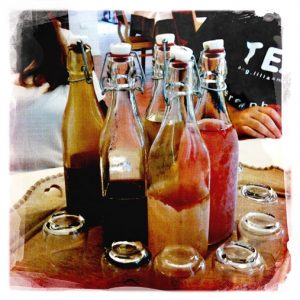 Well, there is one exception to that rule, as there always is in Italy. You can follow an espresso with an “amazzacaffè,” or “coffee killer.” These are also called “amari,” or “digestivi” meant to cleanse your palate and aid in digestion. A good choice is the Sicilian brand Averna, as it can be found in almost every bar and restaurant throughout Italy. Or if you’re really brave, try a grappa (which in America we call “moonshine” or “firewater”).
Well, there is one exception to that rule, as there always is in Italy. You can follow an espresso with an “amazzacaffè,” or “coffee killer.” These are also called “amari,” or “digestivi” meant to cleanse your palate and aid in digestion. A good choice is the Sicilian brand Averna, as it can be found in almost every bar and restaurant throughout Italy. Or if you’re really brave, try a grappa (which in America we call “moonshine” or “firewater”).
I love all the little rules and procedures found in an Italian coffee bar. Once you learn them, you feel like you’ve discovered something important, and in some small way you’ve integrated into Italian society.
One panino, one coffee, three newspapers, and two shots of grappa later, I felt better. Back to that list of errands!
Eleventh Stop: La Sanitaria
What is a sanataria, exactly? Hard to define. I guess it’s sort of like a healthcare shop or medical supply store. They sell wheelchairs, bandages, prosthetic limbs, colostomy bags, catheters, and yes, baby formula.
But not the brand that I was searching for. Alas.
I learned from the clerk that some formula brands are only available at the pharmacy, some at the pharmacy and sanitaria, some at the sanitaria and supermarket. The pharmacy is more expensive, so the supermarket is better if you have the option (often closed on Sundays). But you should definitely buy diapers, wipes, or baby food at the supermarket or sanitaria (unless it is a special, anti-allergic product) because the pharmacy overcharges for these items.
Then the clerk informed me, “And that brand, Neolatte, can only be purchased at a pharmacy.”
An “Aha” moment! I needed to go to the pharmacy anyway to pick up a prescription, so “Perhaps I can kill two birds with one stone,” I thought, “a feat practically unheard of in Italy!”
I could hardly contain my enthusiasm. I rushed back to the metro, and took the A line back to Re di Roma.
Twelfth and Final Stop: La Farmacia
Pharmacies in Rome operate a little differently than in the U.S. A pharmacist in Italy must dispense almost every type of medication, including things as simple as Tylenol. Consequently, the cost of these items is higher. Ironically, because of the state-sponsored national healthcare system, prescription drugs are much, MUCH cheaper in Italy than in the US. In fact, generic versions are often free and name-brand drugs are only 2-5 Euros per month.
It should also be mentioned that Italians are much more conservative when it comes to prescribing and taking drugs. I briefly worked for a pharmaceutical company in Rome where I learned that the US spends more money on prescription drugs than the rest of the world COMBINED! Wow, that was a real eye-opener, especially since I used to be one of those “drug prescribers” in my previous career as a dentist.
Italy also has an increasing number of herbal and holistic pharmacies, which are highly respected, and physicians will often send patients to one of these shops instead of the regular pharmacy if he/she feels the situation calls for it.
Well, I’m writing all of this because my own trip to the pharmacy on that day was a bust. The sign on the door read, “chiuso per lutto,” closed for mourning. A death in the family. Many small businesses have no employees, just husband/wife or father/son duo. So a family emergency often means that the business must close for an indeterminate time.
Of course, pharmacies have provisions for this, and every neighborhood has a rotating list of pharmacies that are designated for just such emergencies. I studied the list on the window and realized that the pharmacy “on call” for that day was a 20-minute walk away. And they wouldn’t have known me there, so inevitably it would have been a very long conversation that would have taxed my linguistic abilities. I had no strength left, and so returned home a defeated man.
Conclusion
It should be said that for nonne who have lived in their same neighborhood for life, this “system” actually works quite well. They know all the shopkeepers, their hours and their habits. In fact, the nonne often get “front of the line” service for their life-long loyalty. And maybe rightly so. They’ve memorized all the bus routes, and are tuned into a possible transportation strike (sciopero) days ahead of time. These ladies actually manage to accomplish their errands on most days, and still have time to get home in time to make lunch. I can only marvel at the skill required to manage such chaos on a daily basis.
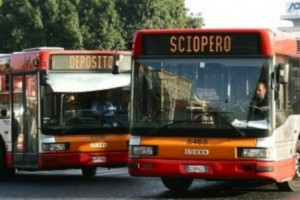 As for me, my day had been a total wash out. At least I had plenty of transportation tickets in my wallet, which was one less thing that I’d have to do the next morning.
As for me, my day had been a total wash out. At least I had plenty of transportation tickets in my wallet, which was one less thing that I’d have to do the next morning.
Then I happened to glance at the evening news on T.V. “Sciopero domani!” “A transportation strike tomorrow!” No metro trains, no buses from 9-5. It would be another wasted day and I wanted to stick my head out of the window and scream.
Luckily I keep a bottle of grappa in the house for just such emergencies.
*IF you’ve made it this far, and you’d still like to check out la dolce far niente for yourself, download my free guide first. You’ll be glad you did!
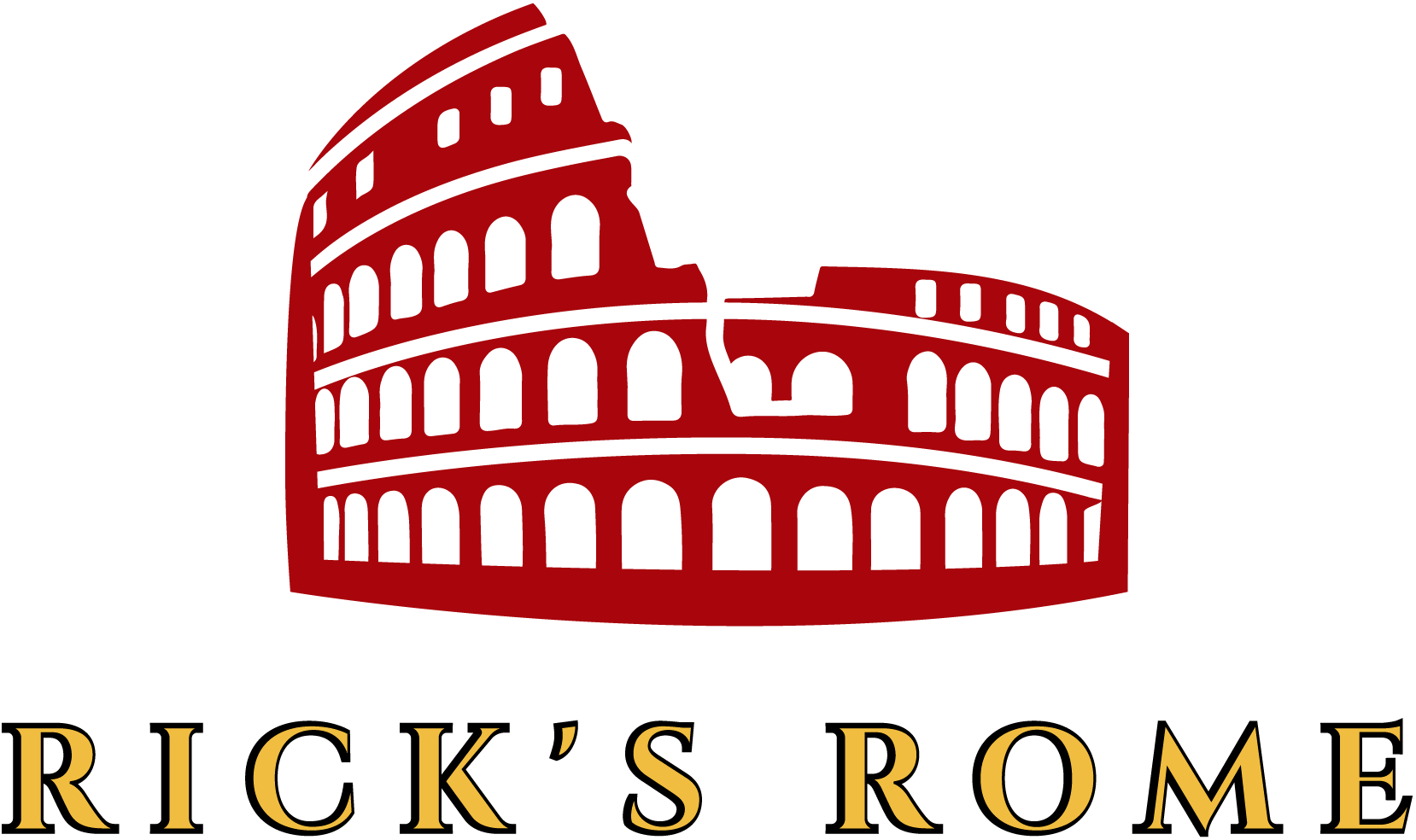
Averna is excellent! I love trying new digestivi, too. It’s so fun.
From the very beginning, at the mention of your innocent little to-do list, I wondered, “Why would he try to do all three things in one day?”
I’ve figured out a few tricks, too. Buy stamps when I remember, not when I need them, and always buy extra (and don’t get stamps for the US. Just get 3 or 4 regular stamps and put them on. My letters have always gotten through except once! And another time I just put 60 cents on it, no kidding…). Know the good hours: renew metro for next month in the middle of the month, not at the end like everyone else; go to the Post Office at 4 pm when it’s always empty for some reason; and so on.
Wait, am I becoming a nonna??
You ARE becoming a nonna at a very early age! But it will serve you well. Everything is so NON-intuitive, that you can ONLY rely on local knowledge. Throw logic out of the window!
Maybe I am crazy, but I would still choose this over the daily grind in the U.S. 🙂
You’re NOT crazy, Tony! I only want to provide a balanced discussion for those who have never lived in Italy and believe that it’s ALL wine and opera music. No, there are some “challenging” aspects, too. But in the end, I think the same as you: it’s worth the trade-offs!
Fantastic read! My husband (Milanese) and I have To-Do lists with a maximum of two items per day for this very reason. In fact, the other day, thinking we were ahead of the game, went to four different places in search of the golden monthly bus pass for my daughter. After our victory we came home, opened a bottle or two of wine and celebrated hahaha despite the multitude of steps everything takes here, without a doubt, I wouldn’t want to live anywhere else!
Isn’t that the truth?!? The smallest victories are cause for celebration. Bravi!!!
Hi Rick:
I was thinking of you when we visited Italy a few months ago (Cinque Terre, Tuscany, Assisi, Rome). It was my 7th or 8th time, and as always, it was awesome, except for Rome. I have Post Traumatic Stress Disorder form returning the rental car to Termini Station. It was a very foolish thing to do–drive through il centro and then circle the train station three times searching frantically, and in vain, for the Hertz garage at the address listed on the Hertz rental paperwork. There was no such garage at the address indicated. Why WOULD there be? The 4th time around I was able to spot a Hertz counter through the train station window and double parked to go in. I didn’t care at that point if the car would be towed, stolen, stripped, set ablaze, or if I would be arrested, or myself set ablaze, like Giordano Bruno in Campo dei Fiori. If any of those things were to have happened, it would have been OK at that point. The man at the counter was pleasant and drew a map for me to the return garage. The rest of that day is a blur. I should have known better, but when you don’t live there, yet you’ve been there enough times to fall in love with Italy, you tend to ignore the harsh realities which you so eloquently illustrate in your blog. There was only one other time that I was as terrified driving a car and that was in Naples, and it was actually worse. Then again, driving along the Amalfi costiera was less than relaxing. You would think we would have avoided returning the car to Termini, but love is blind. Like many Americans stuck with Cupid’s arrow for Italy, I pine for a life there, so I appreciate the reality check your blog offers.
My heart goes out to you for braving the city streets of Rome. I’ve had many similar experiences, of course. And while stressful, once accomplished it feels like you’ve climbed Everest, doesn’t it? As far as my reality check, as I often say, the “real” experience is (eventually) more rewarding than the one invented in our dreams. So I don’t mean to discourage people…rather, I only want to ENcourage them to push past the initial barriers and find a more authentic relationship with Italia… as it seems that you’ve already done!
Ohh how we laughed at my house after reading your wonderful post! My husband stated that he keeps his hair short so that he can’t pull his hair out after a day like yours. For me, well my days of running to Target and swiftly getting things done in one fell swoop are long gone, and now as business owners working in two countries learning how to just ask the right question is a learning experience.
Thank you for putting all my frustrations into words that made me laugh out loud and seek out my favorite grappa to rinse my expresso with!
Ha, ha! Glad you’ve learned how to adapt. And yes, grappa is the perfect, “coffee killer,” as they say here in Rome!
Great read! Having experienced many of those same problems during my extended stays in Italy, I had to laugh. Schadenfreude I guess. Somehow it all works out, but can be frustrating at the time. As an American I am very spoiled by convenience, but have learned to adjust when in Italia.
Right, adjust or you’ll go crazy here. But yes, somehow it all works out. Not always as expected, but it all works out.
Hi Rick – and thank you so very much for educating us while keeping us entertained. Have never heard of Averna Amari, so I will definitely give it a try on our next trip to Italy in May 2016. On our last visit to Italy in 2012, I ordered Grappa after a meal in Rome and the waiter brought me a little shot glass of……..WATER! The entire staff watched as I drank it to see if I knew what I had ordered. I think they figured I was just a stupid ‘mericana’ (which I am – but thanks to you I’m learning more) LOVE reading about your life in Italy!!
Oh, Averna is the best! Well, I like it, anyway. Lucano is good, too. But yes, Grappa is to approached with caution. Not nice for the waiter to play tricks on you, though!!
IL dolce far niente!! Masculine perhaps because males are hopeless shoppers. Couldn’t resist that…. Almost all absolutely true. But when you leave to go back and live somewhere “normal” it gets boring. You get all your errands done in half an hour, no dallying in coffee bars or telling your life story to a complete stranger as you stand in a queue, no feeling of achievement when you do finally manage to find that damn monthly bus pass! My one piece of advice: order the baby formula from your chemist! There is a huge chemist just near where I live (Prati) that gives huge discounts for formula and nappies… Keep up the good work. It is always fun reading you.
Right! Thanks for catching the grammar error! And it’s true, other places no seem boring by comparison. But once in a while I just need to get stuff done!!!
Great analysis of life in Italy
Grazie!!
Well, I’m sitting at my desk laughing my head off…as we say in ‘Merica. Memories of my time in Italy are flooding back. I was so confused much of the time…finally I lost my sense of humor in complete frustration with some poor innocent Italian in Sorrento. He explained ( as if it should be obvious) that there are 3 bus companies in Sorrento. In order to buy a ticket I’d have to wait 3 hours and know which bus company went to my destination. I completely lost it – I think I actually yelled at him. So, now, reading your article I absolve myself. It’s funny now but then it was ‘an experience’ which meant that I walked back to my glorious hotel overlooking the Bay of Naples. I’d do the whole thing again in a heartbeat…it was my favorite place in the world.
That’s the trade off, isn’t it? If Italy suddenly became logical and efficient, it wouldn’t be nearly as “charming.” 😉
thank you for the hilarious “coffee break” whilst at work…
Prego!!
Fun read though I have experienced a lot of it in Italy. Didn’t know about the sanitaria however. But ahhh the dreaded sciopero! I’ve been there, done that plenty of times. Fingers crossed for this December/January. And I have a bottle of Averna Amari in my pantry right now. Learned about it almsot 30 years ago from co-students in Giuliano Bugiali’s cooking school in Florence/
A presto,
Joan
Well Joan, I don’t know how you’re planning to stay in Dec/Jan, but if you’re here for more than a week, there WILL be a sciopero during that time. Just hope that it’s not while you’re trying to get to the airport or something.
P.S. Averna is my favorite!!
As to your “sweetness” my Italian husband had a saying “How sweet to do nothing, and then rest”.
That sums it up pretty good!!